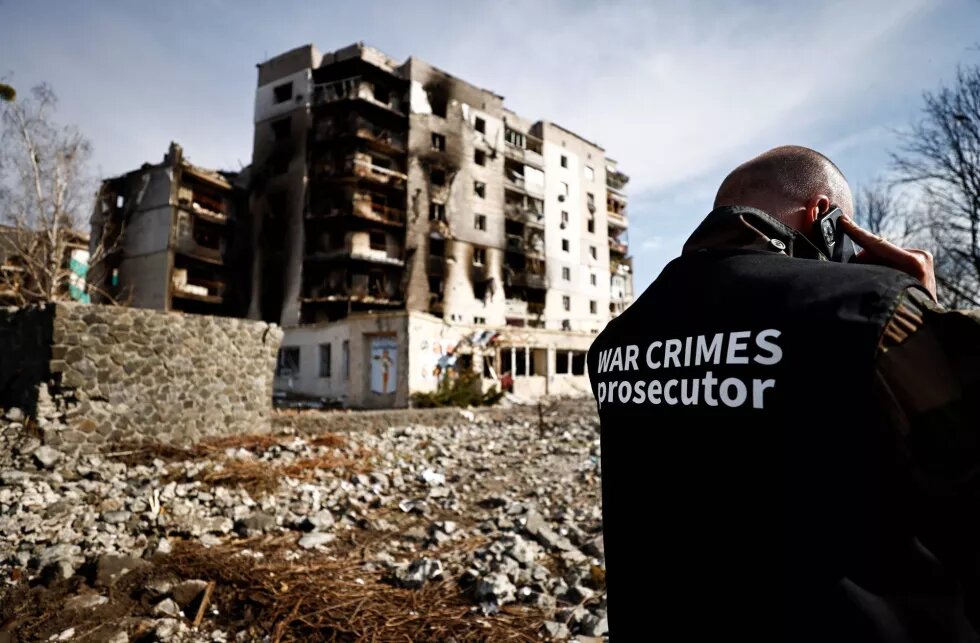Leaflet was originally developed and published within the project Sharethetruths.org, supported by Heinrich Boell Foundation.

Torture and willful killings of civilians
«Persons taking no active part in the hostilities […] shall in all circumstances be treated humanely […] the following acts are and shall remain prohibited: a) violence to life and person, in particular murder of all kinds, mutilation, cruel treatment and torture» Article 3 of the IV Geneva Convention, 1949
After the withdrawal of Russian forces more than 900 civilian bodies were found in the Kyiv region. The largest number of victims was discovered in Bucha: the bodies of dead civilians were found lying on the streets, some with their hands bound, some with gunshot wounds to the head. There are reports of Russian forces shooting and killing people waiting in line for bread in Chernihiv, holding civilians in underground torture chambers in Trostyanets. In the occupied Kherson region, about 500 people - activists and members of the anti-terrorist operation - are kept in basements being tortured right now.
Indiscriminate attacks and attacks on civilian objects
«Indiscriminate attacks are prohibited [i.e. those, which are not directed / cannot be directed at a specific military objective]. Civilian objects shall not be the object of attack or of reprisals» Articles 51, 52 of the I Protocol Additional to the Geneva Conventions, 1977
Russia constantly attacks civilian targets in Ukraine, including residential buildings, factories, educational and healthcare institutions. On 16 March 2022 Russian forces bombed Mariupol Theater, which was used as a shelter and clearly marked with a word ‘children’ painted in giant letters outside. Russian forces repeatedly use indiscriminate weapons, including cluster munitions that have already caused hundreds of civilian casualties.
Sexual violence
«Women shall be especially protected against any attack on their honour, in particular against rape, enforced prostitution, or any form of indecent assault» Article 27 of the IV Geneva Convention, 1949
Following the retake of territories occupied by Russia, reports of widespread rape and sexual abuse emerged. There were incidents of gang rape, rape in front of children, rape before being killed, and rape after witnessing a husband's execution. According to the Ukrainian Ombudsman, 25 girls and women aged 14 to 24 were systematically raped in the basement of one house in Bucha. Nine of them became pregnant. Russian soldiers told them they would rape them to the point where they wouldn't want sexual contact with any man, to prevent them from having Ukrainian children. While most victims are female, men and boys are also among the alleged victims of rape by Russian soldiers in Ukraine.
Torture and killings of prisoners of war
«Any unlawful act or omission by the Detaining Power causing death or seriously endangering the health of a prisoner of war in its custody is prohibited, and will be regarded as a serious breach of the present Convention» Article 13 of the III Geneva Convention, 1949
According to the Ukrainian Ombudsman, Ukrainian prisoners of war are tortured in captivity - beaten, humiliated and threatened with murder. There are reports of Russian soldiers cutting off the fingers and wrists of Ukrainian prisoners of war; and shooting a Ukrainian prisoner of war in the back for requesting permission to use the toilet.
Forcible deportation
«Individual or mass forcible transfers, as well as deportations of protected persons from occupied territory to the territory of the Occupying Power […], are prohibited, regardless of their motive» Article 49 of the IV Geneva Convention, 1949
As of May 2022, about one million Ukrainians have been deported to Russia, 182 000 of them are children. According to witness accounts, in a heavily shelled city of Mariupol Russian troops just walked into a bomb shelter and ordered all the women and children to leave. Before forcible relocation to Russia Ukrainian citizens are taken to “filtration camps”, where they are photographed, fingerprinted, interrogated, and their phones are searched. At the end of April 2022, 308 Ukrainians from Mariupol were forcibly deported to the Far East of Russia - 8000 kilometers from their homes.